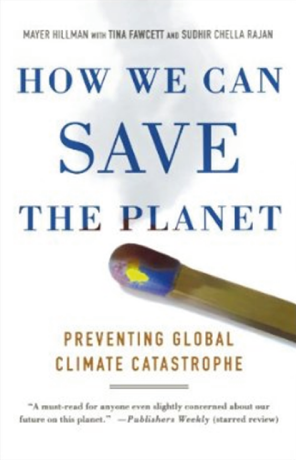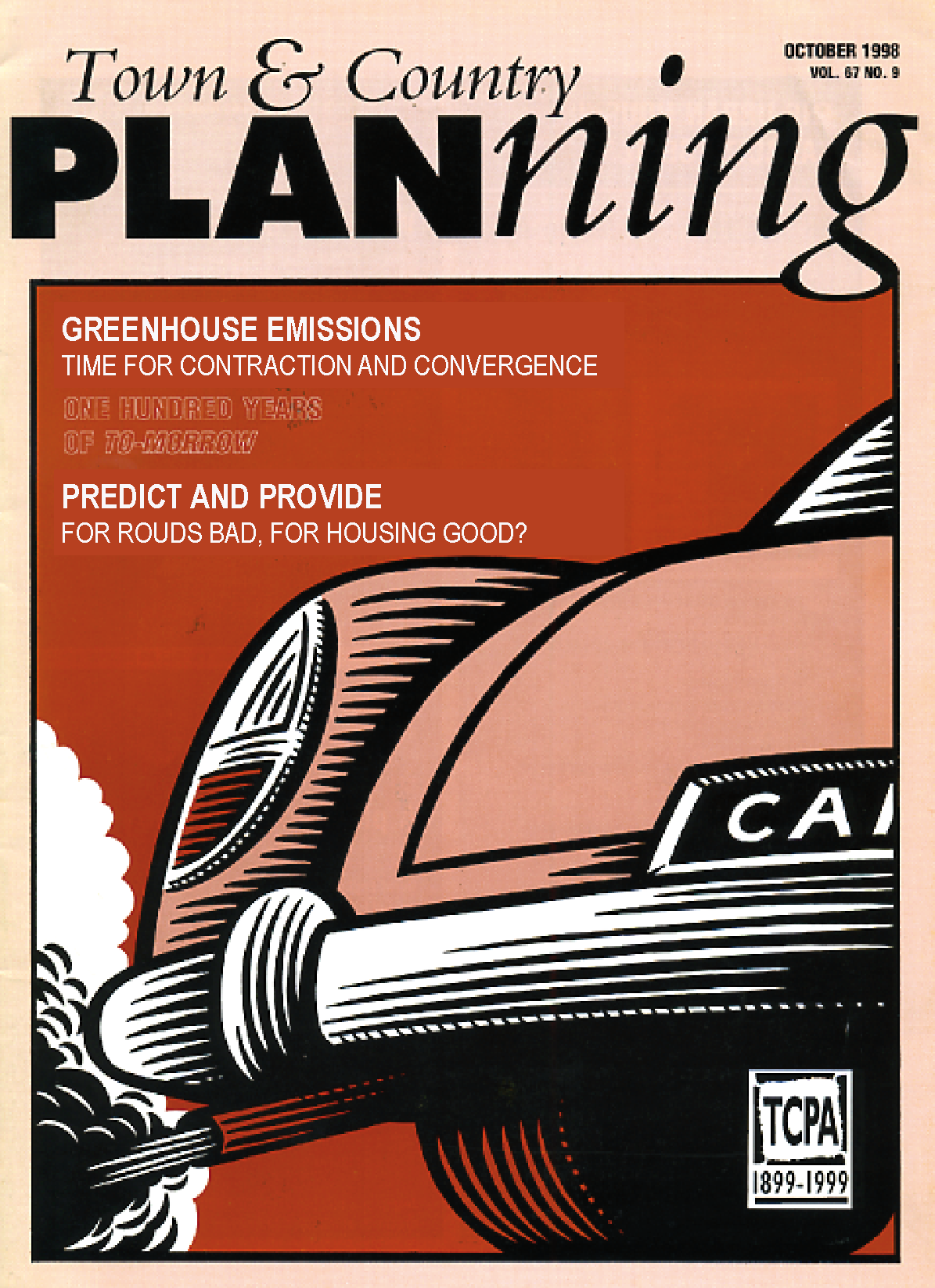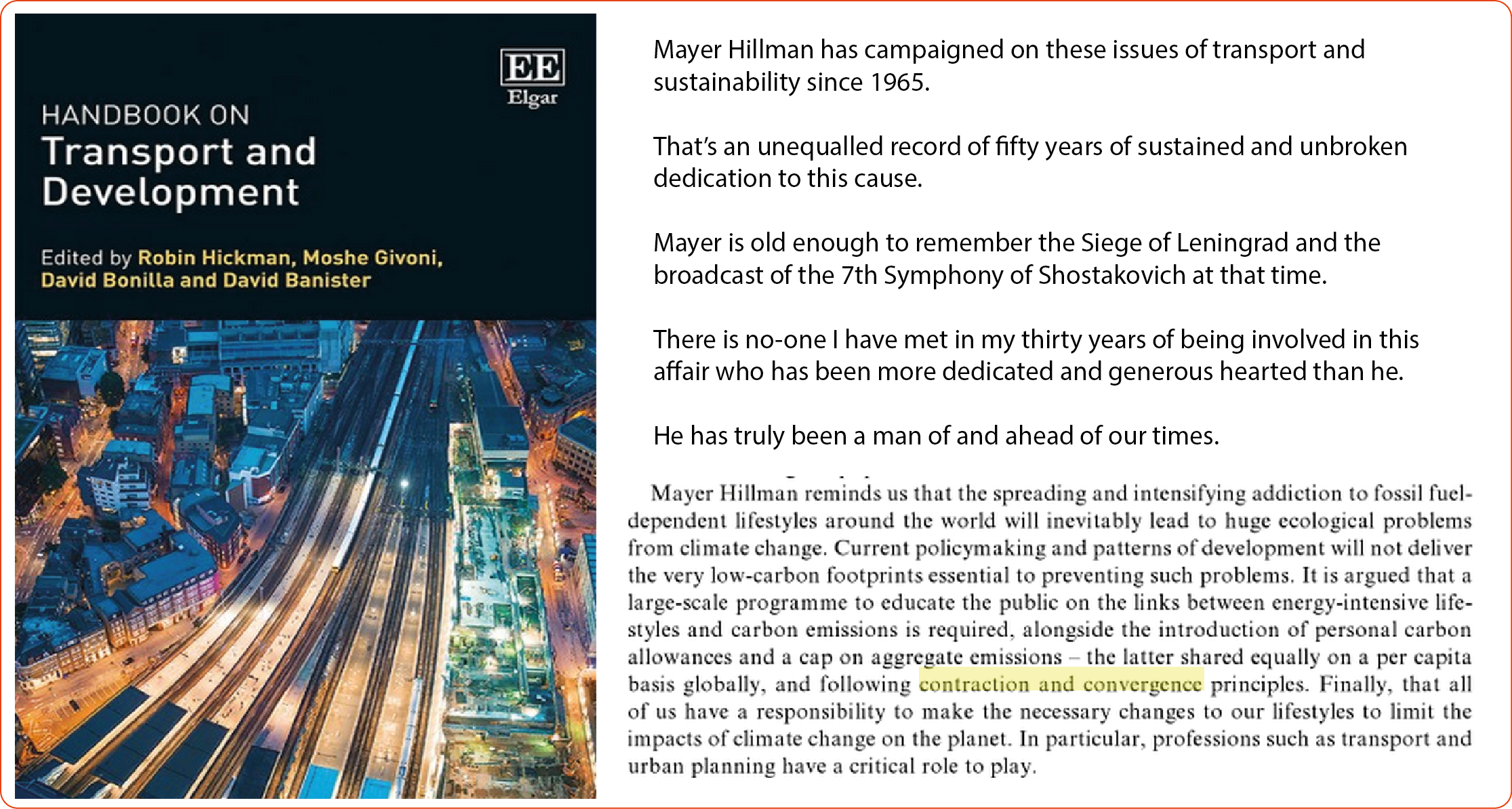This letter was sent today by Dr Mayer Hillman of PSI. It expresses grave concern about the confused attitude of British civil servants as they prepare for climate change negotiations at COP-17.
The letter was sent to Dr William Rees, Terry O'Connell and Mike Hutchinson.
It was also copied to an extensive list of other eminent persons.
Stop Press - most recent addtions to this correspondence are at the bottom of this page.
Dear Bill, Terry and Mike,
I have waited a couple of weeks for a reply from Tom Burke to my email of 2 November asking him at least to give references to where his alternative framework can be found. However, with no reply forthcoming after this length of time, I think it reasonable to assume that he does not intend to provide this. This is in spite of the fact that, as I pointed out, I do not see how that would impose much of 'a call on his time' by simply letting me know the best site for his recommended alternative to C&C. His grounds for not being prepared to continue with the exchanges were, as you may recall, simply that his views were too well-known to need repeating!
You may have seen an article by John Ashton in yesterday's Guardian, The planet has no plan B
Like Tom Burke, John Ashton is a 'founding director of E3G'. They effectively speak with one voice. It would appear that John too is happy to leave those with an interest in his reflections on the dire predicament in which we find ourselves, guessing as to what his 'take' on the way forward actually is, though his article falls short of actually stating this.
In reality, his strategy is actually a mix of ignoring the other side and just more guesswork. His article says: -
- an agreement at Durban based on 'a voluntary (my italics) framework' will prove insufficient;
- what is needed is an 'effective regime binding all major economies' . . .
- he then states that this requires a second phase of Kyoto commitment from those willing (again my italics) to accept them!
- He also quotes the calculation of expert climate scientists that global emissions must not exceed two degrees Celsius,
- but says nothing about how this framework will be structured, implying that we will be starting again from scratch.
Thus, in common with Tom, John Ashton makes no attempt at all to set down the 'globally structured time-line' for what he nonetheless
believes must be a workable framework for global resource-sharing, working under a now extreme time-constraint.
Worse still, like Tom, he appears to be unaware or culpably unwilling to admit to the facts that: -
- the UK was already party in December 2009 to laying out C&C at COP-15;
- this was in a version where the rates of C&C were prescribed as those that are already in the UK Climate Act of 2008 with convergence by 2050;
- while the C&C principle was accepted at COP-15, the rates prescribed by the UK for total convergence by 2050 were not.
- the UK Government foolishly blamed the disagreement and negative result from COP-15 on the Chinese Government;
- However, the Chinese Government had published a document on this in July 2009. This said the convergence to tradable equal per capita emissions entitlements should be immediate upon the agreement being reached even if convergence to actual per capita emissions would only be completed by 2050.
- Any differences between the two could be traded away.
There is no way of scrutinising Tom Burke's 'proposal' because, as far as one can tell, he doesn't have one. Furthermore, in his Guardian article, John Ashton simply promotes the view that the way out is 'technology and capital'. Tom asserts that we don't need a framework for limiting a global temperature rise to a maximum of two and three degrees, while John quotes the IEA as saying that, within 5 years, the two degree maximum will have gone for ever!
What conclusions can we, and those to whom our exchanges have been copied, draw from all this? Can it be that, in fact, neither of them have an alternative framework because they and the key politicians whom they advise don't want a framework even if it is obviously - and by definition - necessary to sharing out a global resource within a specified time-frame? Do they want to be able to
blame the other side for the inevitable failure that attends our refusal to listen to what they are saying.
It seems we have to choose between pressing again for a sight of some documentation of what their strategy actually is, or now highlighting their disingenuous contribution to the debate on where we should go from here.
What do you think?
Warm regards
Mayer
Dr. Mayer Hillman
Senior Fellow Emeritus
Policy Studies Institute
c/o The Coach House
7a Netherhall Gardens
London NW3 5RN
Tel. 020 7794 9661
www.mayerhillman.com
More correspondence and commentary here
From: "Mayer Hillman" <mayer.hillman@blueyonder.co.uk>
To: <Tom.Burke@riotinto.com>
Cc: to a considerable list of eminent others
Subject: Your BMJ article
Date: Fri, 23 Mar 2012 14:05:43 -0000
Dear Tom,
Following our unfortunately sharp email exchanges a few months ago in which I unsuccessfully sought to get you to reveal what strategy you are advocating to prevent dangerous rates of climate change and ecological disaster, I anticipated that the article that the BMJ commissioned you to write for publication in the current issue - see here - would be seen by you as an ideal opportunity to set that out, particularly as its title is ‘Climate change: what needs to be done’.
Your understanding of the subject has led you to aver that the means of avoiding the grim future ahead of us poses no great problem. In your view, what is missing is the political will to apply ‘all the technologies and engineering knowledge’… ‘to construct a carbon neutral global energy system by the middle of the century’ and that the costs of doing that are not prohibitive. This is a statement with no precision that would enable it to be tested within a framework for analysing its efficacy.
I remain unclear as to whether you accept the need for such a framework and, if so, whether you see the GCI’s Contraction & Convergence [C&C] as the right one, given that it simply draws the boundaries of the contraction process which a consensus of climate scientists has determined and reveals transparently the consequences of converging at whatever a rate results from international negotiations. There is no reason whatsoever to assume that C&C ignores or dismisses the critical role that technology will play in the future. On the contrary, implementation of a variety of solutions is vital.
However, C&C does not address that. What it addresses is the intransigent deadlock at the UNFCCC that still exists in that arena. Rooted in the science of IPCC WG1 and for the benefit of negotiators at the UNFCCC, it simply and transparently reveals a way of breaking that deadlock at the UNFCCC in a manner that has a chance of creating the compromise that must be secured while remaining within the time-frame necessary to avoid exceeding a two degree average temperature rise above pre-industrial levels. Moreover, as this report for former Environment Secretary Hilary Benn shows (quoted recently by WRI - see http://www.gci.org.uk/Documents/Benn_DEFRA_15_11_07_.pdf ).
C&C does not prescribe the rates at which it must be adopted: it merely reveals the range of rates available to the negotiators.
You simply say that your ‘very strong feeling’ is that the resolution of the problem of climate change requires winning a battle between those who care about the future (in your view, those under the age of 40) and those who want to stay in the past (those over 40)? Are you now saying that what you call this 'insurrection' is what negotiators at the UNFCCC must negotiate? This is hardly a move towards helping them to agree a numerate and transparent framework. This is not clarification leading to any progress. It is more avoidance leading to more chaos.
Yet, as you say, 'we cannot afford this prevarication’ especially in light of the fact that the concentration of carbon dioxide in the atmosphere continues to rise inexorably and ‘effectively irreversibly’.
In a completely groundless manner, you have continued to be very vocal in your opposition to C&C. Surely joining with the growing political will for C&C makes much more sense than for you now to prefer becoming an advocate of 'insurrection'. After all, I cannot see that C&C runs counter to the themes raised in your article.
A further intriguing aspect of your article is your declaration at its end that you have ‘no financial relationships with any organisations that might have an interest in the submitted work’. How can this reconciled with the fact that you have been retained for many years by Rio Tinto Zinc, and that your personal opposition to C&C runs counter to that of this organisation which provided assistance for the publication by the Chinese Government in 2009 of the report by the China Economy and Business Programme of China’s New Place in a World in Crisis? This report adopted the C&C framework – based on the principle of equity to reflect each nation’s common but differentiated responsibilities in achieving UNFCCC compliance.
Please do find time to respond. One thing on which we are wholly in agreement is the urgency with which the world’s nations must reach agreement if those succeeding us are to have a future. Can we do so?
Yours,
Mayer
Dr. Mayer Hillman
Senior Fellow Emeritus
Policy Studies Institute
c/o The Coach House
7a Netherhall Gardens
London NW3 5RN
www.mayerhillman.com
Dear Mayer,
I agree that the recommendation made by Tom Burke that we call upon the under 40's to rise up against the over 40's is recommending avoidance leading to chaos. It also finally confesses to the inability of our political leaders and their appointed advisors to propose a rational solution to the threat of climate change. This failure of leadership is not going to be absolved by trying to pass the buck to a younger generation.
The problem will remain the same. Politicians (and their advisors) will still have to inform their chosen foot-soldiers of the dire state we are in and the extent of the changes that are required to our way of life.
The record so far of UK government in this leadership role has not been something of which we can to be proud. The emissions budgets in the 2008 Climate Act are based on global emissions reductions of 4% per annum commencing in 2016. The government's own scientific advisors calculated that this scenario had a 44% chance of keeping global temperature increase within 2 degrees centigrade. The government chose the "2016 4% Low" case from scenarios ranging from 1.5% to 4% reduction rates. Recently, James Hansen has suggested that if we were to start reductions in 2012 the rate should be 10% if we were to achieve his recommended 350ppm concentrations target.
UK government has gone as far as any other in revealing the nature of the response that is required, although its calculations are now seen as dangerously misleading (Philosophical Transactions of the Royal Society, A doi:10.1098/rsta.2008.0138).
The difficulty some politicians and their advisors have in recognising C&C is that they are incapable of being frank and numerate about the scale of the problem and the required response with its costs to society. Sooner or later they will be called to account. C&C is not the problem, it simply demands transparency. Some of these advisors are already saying in private that it is already too late to keep within 2 degrees.
With kind regards,
Terry O’Connell
Dear Aubrey
Yes, of course [!] I’m more than happy to be a co-signatory.
Mayer
Dr. Mayer Hillman
Senior Fellow Emeritus
Policy Studies Institute
c/o The Coach House
7a Netherhall Gardens
London NW3 5RN

“A brilliant, imaginative and simple means of reaching such an agreement on emission reductions has been put forward. Known as Contraction and Convergence (C&C), it was first proposed by the Global Commons Institute (GCI) in the early 1990s. Recognition of its unique qualities as a framework for combating climate change has grown at an astonishing rate since that date. It is thought by an increasingly influential number of national and international institutions to be the most promising basis for global negotiations.”
How We Can Save the Planet
Mayer Hillman on C&C

Nomination of Aubrey Meyer for ZAYED PRIZE by Mayer Hillman

Time for Contraction and Convergence
Town and Country Planning - October 1998
Edited By Mayer Hillman

~~~~~~~~~~~~~~~~~~~~
Not Climate Denial but C&C Denial.
Is it now C&C-Deniers who should face charges of crimes against humanity?

International Health Policies
Headlines in Global Health Policies Reactions from Global South Experts
This week BMJ casts a spotlight on climate change. The journal provides a nice collection of articles with the latest news, state of the art research and viewpoints on the enormous political challenge. Some articles explore how a low carbon economy can boost people’s health, whether contraction and convergence is the way forward, etc. Suffice it to say: recommended reading.
You can tell people are getting downright desperate, if ideas are being floated like Tom Burke’s: “My own very strong feeling is that what it’s really going to take politically to solve this problem is an insurgency of those under 40 against those over 40.“ If only it were that simple. This is anything but a generation issue (full disclosure: I turn forty in October). Last time I checked, greed was still in all of us, young and old. Adjusting incentive structures of decision makers and CEOs seems inevitable and part of the solution. However, in this short piece I’d like to focus on the popular claim that health professionals are “uniquely placed to guide the climate change conversation towards better policies that are good for the planet and for people.” They are, indeed, and pointing out that a low carbon economy would also be great news for our health is an excellent example of this. Publications like the New Economics Foundation’s ‘The great transition’ are very much in line with this kind of thinking.
Time to stop instrumentalizing health for economic growth
2012-03-23 13:50:39 Editorial - Kristof Decoster

